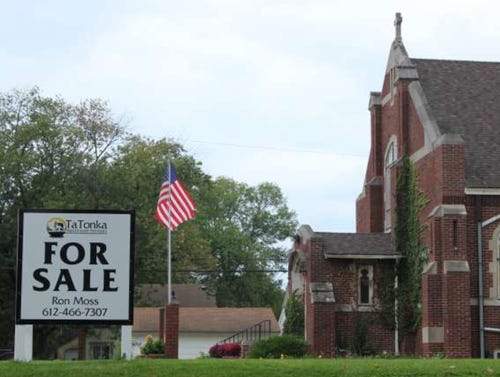Crossroads -- What's up with all those closed churches?
Some churches grow, while others decline -- often in the same healthy city
Right now, the greater Knoxville, Tennessee, area — prime Bible Belt territory — is growing like crazy. All kinds of people are moving in from all over the place.
We have growing evangelical megachurches. We have growing Baptist churches, and shrinking Baptist churches. We have healthy mainline Protestant churches, stalled mainline churches, shrinking mainline churches and dead mainline churches. Many Catholic parishes are growing. Others are not.
Why do churches grow? Lots of reasons. Why do churches shrink and die? Lots of reasons. That’s the complex reality that we discussed during this week’s “Crossroads” podcast. As a starting point, we focused on a Religion News Service story that ran with this headline: “Thousands of churches will likely close down. What happens to all that real estate?” That feature was written by religion-beat veteran Bob Smietana, author of the book “Reorganized Religion: The Reshaping of the American Church and Why it Matters.” Here’s some crucial material from that RNS report:
If experts were predicting that 100,000 libraries across the United States were likely to close in the next few decades, people would probably sit up and take notice. Certainly, if 100,000 school buildings were going to be empty in small and large communities, someone would be talking about it. …
Church closures are happening in every single corner of the country. North, south, east, west, rural, urban, doesn’t matter.
Everyone knows many churches are closing. It’s also clear that many sanctuaries will live on as restaurants, condos, art galleries and offices for non-profits of all shapes and sizes. Oh, but some of them — if church officials allow — will be sold to people planting new churches or to growing congregations needing new homes.
But why are some churches growing, while others decline? My former GetReligion colleague Ryan Burge took on a related subject in a Substack post — “What Predicts Church Growth or Decline?” — that is must reading. Here is his bottom-line:
You can learn a whole lot about a church by looking at one simple thing: their location.
Such as:
Nearly sixty percent of the fastest growing churches in the United States in 2021 were in the South. Just six percent were based in the northeast. That cannot be some type of coincidence. That data is overwhelmingly clear in this point — churches are growing faster in the South than other regions. Church growth is not random, it’s actually a function of geography.
But what about the growing Sunbelt region in which I live? Why do some churches thrive, while others shrink?
Consider these three questions, which an Anglican bishop from a growing diocese in Africa once asked to bishops from fading churches in Europe and North America: “Where are your children? Where are your converts? Where are your priests?”
Enjoy the podcast and please share it with others.
FIRST IMAGE: Uncredited real-estate photo with “Church for sale” story at SouthwestJournal.com.






My kids and I went to services at Boston's Old North Church 2 years ago while on vacation. It was Columbus Day. There were pride flags hung outside and inside the "sanctuary" (I put it in quotes for reasons that will be obvious) and their guest pastor, an American Indian "bishop" from New Mexico, included a prayer thanking the great spirit father for granting us the "holy strawberry". (My kids had been doing great, but they couldn't hold it together at this point.) I knew this would happen, which is why I took them there and warned them that it would be weird. It was. But it's the Old North Church; you go for historical, not theological reasons.
Liberal Christianity (as is common in the Northeast) is purposeless. If Jesus was just a nice teacher, the virgin birth is a prop for the patriarchy, the resurrection is metaphorical, and sin is subjective... what exactly is the point of church? It's not a church; it's a social club like the Elks or the Masons, both of which are also in freefall.
On the other hand, if an omnipotent God cares and loves us, if he makes real demands on us for our own good, if sin is a violation not of our consciences but of the natural order of the universe itself... church is where you go to help you assault the universe less. Church is where you go to achieve oneness with God (theosis) and natural law. Church is what makes you a whole human being. Church is, as Jesus said: "a hospital for sinners."
The former view pervades liberal, secular, urban, New England communities. The latter view pervades the South. It's not geography that causes church growth; it's culture. Courtesy of The Big Sort, that culture tends to be geographically specific. If you were to graph the "church growth" variable against the "how many demands does the church make on its adherents" variable, I suspect there would be a high positive correlation even controlling for geography.
Location, location, location.
I’d say that is truly the bulk of it, but I worked for a church in Englewood Colorado that had a location that was the envy of other congregations. Ultimately it has stagnated and is in a slow motion decline. The deep pockets of a few key givers is forestalling the inevitable, but I foresee that the faith will not be passed onto the children and grandchildren. Ultimately they have no vision for growth. It has become a sort of family chapel. It brings to mind Proverbs 29:18, “where there is no vision, the people perish.”